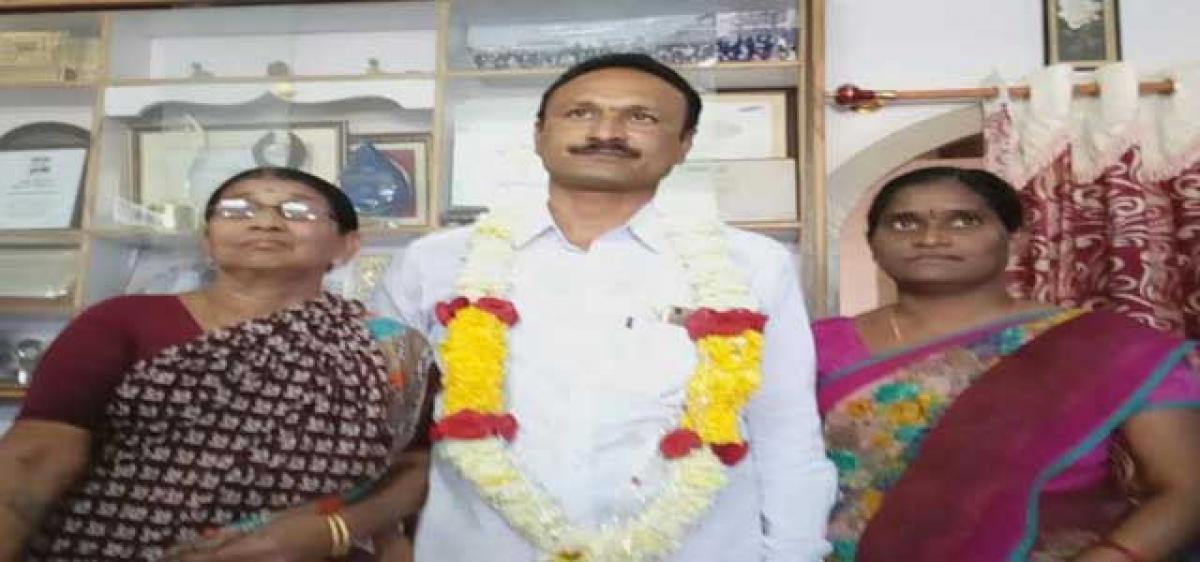Live
- Tumakuru dist to eliminate maternal, infant mortality
- BJP to observe Good Governance Day on Dec 25
- Why is ECI afraid of transparency: Cong
- Parliament tussle puts every Indian to shame
- GST at 18% on used EV car sale
- Collector takes part in cleanliness drive
- Ramraj Cotton opens new showroom at Jangareddygudem
- Nine persons killed in two separate accidents
- Pawan vows to lay roads to remote tribal villages
- Ministerial panel to draft scheme for free bus travel sop to women
Just In

Son of the soil Chintakindi Mallesham of Aler mandal was conferred with prestigious Padma Shri award for his ASU Machine invention, which reduces the time and menial labour of four hours required to weave Pochampalli silk sarees to just 1.5 hours.
He invented Laxmi ASU machine to reduce the time and labour required to weave Pochampalli silk sarees
Bhongir: Son of the soil Chintakindi Mallesham of Aler mandal was conferred with prestigious Padma Shri award for his ASU Machine invention, which reduces the time and menial labour of four hours required to weave Pochampalli silk sarees to just 1.5 hours.
Mallesham, a Class 10 school dropout with no technical knowledge, had successfully invented the Laxmi ASU machine to minimise the hardships of his mother while weaving the sarees. He received Amazing Indians Award from the hands of Prime Minister Narendra Modi and also got best innovation award.
The Centre on Wednesday has announced his name for Padma Shri award for the year 2017 under Science and Engineering category for his innovation of ASU machine.
Handloom sarees in India are in great demand. But few people know the hard work that craftsmen put into it. To reduce the discomfort and time of weaving, Mallesham invented the machine in the name of his mother Laxmi, where sarees can be weaved with much ease.
He developed the ASU machine in 2000, which automated the process of spreading 10.5 km of silk thread around 41 steel pins for making a Pochampally saree. The manual process was tedious and women from weaver families had to move their hands 9,000 times to make one saree.
The machine, which has been named after Mallesham's mother, can make a saree in about one-and-a-half hours as opposed to five hours in the manual process. The mechanised process besides increasing productivity (eight sarees a day) has reduced drudgery and allowed variety in style and design.
This worthy son, without any formal education, developed machine to ease the pain and suffering of his mother. In the process, he enhanced the quality of life of many other women weavers in Nalgonda district winding process of yarn, called ASU.
Mallesham said with the help of Fuel, a crowd funding Agency, he has taken up the manufacturing of ASU machines and extended 800 machines to the weavers at the cost of Rs 25,000 each. He said the award has increased his responsibility.
“I feel very happy when several women tell me that ASU machine has given a relief to them,” said Mallesham’s wife Suvarna, stating that her husband would continue his services for the betterment of weavers’ community.
Expressing her happiness, Mallesham’s mother Laxmamma said, “When I advised my son not to enter into caste-based profession and explained pain in ASU work, my son has made it clear that he would continue in the profession and took efforts to prepare the ASU machine.
After failing in his initial efforts, my son succeeded in inventing the time-saving machine.”

© 2024 Hyderabad Media House Limited/The Hans India. All rights reserved. Powered by hocalwire.com







